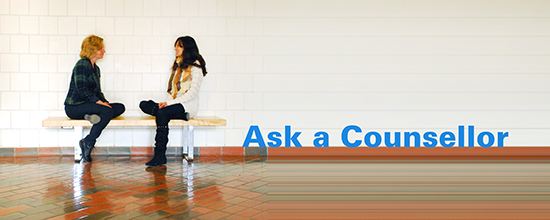How can counselling help?
Question: I have not seen a counsellor before and am not sure what kind of issues I could go see a counsellor for. What are some ways seeing a counsellor can help me address my problems?
Answer: I remember the first time I went to see a counsellor. I was so nervous! I try to remember that when I meet with students now, and I’m glad you are asking for some information to help the process. The SCS website gives a more detailed explanation of the issues (crisis counselling, personal, career, educational) that students can bring to counselling and there is also a link to a video interview, where I had a chance to explain my vision of the counselling process (I broke out in a cold sweat, by the way, when I learned it was on YouTube , but it’s there if you are curious).
The bottom line is that counselling is often most helpful when it is done collaboratively. The student and the counsellor need to develop a shared sense of the problem and the desired change, and then work together to develop a plan for creating that change. This might mean students learn and experiment with a regular practice for stress management, someone with ADHD may experiment with a new strategy to improve their academic performance, a student uncertain about their future might explore how personal qualities relate to career options, or students may attend counselling to begin to address past traumatic experiences that continue to interfere with their well-being. We also support students to build their resilience. Attending a workshops is also an option. We often hear students say how nice it was to be in a group where there is a shared interest in the issues at hand, but that first step is sometimes hard to make.
I hope this helps to make stepping up to our counter in U216A, or making that phone call to book an appointment, just a little bit easier.
Associate Professor, Registered Psychologist

Exam Anxiety
Question: What are some great ways to relieve stress, especially exam stress?
Answer: First, it is worth making a distinction between eustress (beneficial) and distress (a response that interferes with performance). The kind of stress that you might experience in response to exams is helpful when it drives you to take positive actions. If your stress about an exam drives you to study, do practice questions, talk about the material with others, and, even better, teach the material to someone, it is going to be beneficial. Incidentally, understanding how to study the material and being prepared is the best strategy for managing exam anxiety, and MRU’s Student Learning Services supports students in developing their academic skills.
However, I assume you are talking about the unhelpful kind of stress that might lead you to procrastinate, withdraw, experience physical tension and aches, and that can lead to a compromised immune system. This stress often occurs when we sense that the demands we are facing are greater than the resources we need to deal with them. So one option for managing this is to try to shift the balance: are there ways you can reduce demands (e.g., work less during exam time) or are there ways to increase your resources (e.g., increase your study skills or get someone to take over for you on some things)? Doing this with a trusted person might help you to gain perspective that is hard to access when we are stressed.
Once you have tried to restore some balance and feel less overwhelmed, you can look at ways to mitigate the negative effects of stress. You might take mini breaks, go for walks, do something that gives you joy, pet puppies, express gratitude, or spend some time looking at the sky and breathing deeply. Anything that eases body, mind, and spirit fits into this category.
Finally, there are things you can do just prior to an exam and during an exam to relieve the kind of tension that interferes with clear thinking. Creating some quiet for yourself prior to the exam is likely more helpful than trying to scan the text one more time or listening to others talking about what they studied (both can raise anxiety). If you feel shaky, take a moment to tighten the muscles in your fist, arms, and shoulders, hold them for 10 seconds and then suddenly release them (repeat as needed). Breathing into our belly and breathing out slowly tends to have a calming impact. One way to be more resilient in response to increased demands like exams, is to make sure these practices are a regular part of your life.
Check out the SCS workshops that can help you learn to manage stress for the long term. As well, try out the many anti-stress events sponsored by SAMRU, and the various Student Services areas, during exam time.
Regards,
Associate Professor, Registered Psychologist

